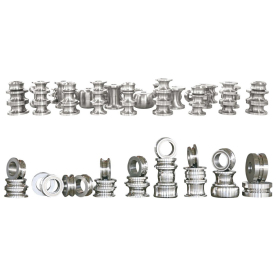[Solid state high frequency welder machine]Revolutionizing Industrial Manufacturing: The Impact of Solid State High Frequency Welder Machines on Efficiency and Precision
News 2024-8-24
****In the realm of industrial manufacturing, the quest for enhanced efficiency and precision is an ongoing challenge. One of the most transformative technologies aiding this pursuit is the Solid State High Frequency Welder Machine. This innovative welding solution has begun to redefine traditional welding processes, offering a multitude of advantages that promise to optimize production workflows.
Understanding Solid State High Frequency Welding
Before delving into the benefits, it’s essential to understand what a Solid State High Frequency Welder Machine is. Unlike conventional welding machines that rely on transformers and vacuum tubes, solid-state welders utilize semiconductor technology. This results in a more efficient, reliable, and compact unit capable of generating high-frequency electrical currents.
The performance of solid-state welders is largely attributed to their ability to operate at higher frequencies — usually between 200 kHz and 1 MHz. This high-frequency operation allows for quicker heating and cooling cycles, contributing to an overall reduction in processing time. Consequently, manufacturers stand to gain not just in terms of speed but also in energy efficiency, as these machines consume less power compared to their conventional counterparts.
Benefits of Solid State High Frequency Welders
1. **Enhanced Precision**: One of the most notable aspects of solid-state technology is its ability to provide exceptional control over the welding process. The constant flow of high-frequency energy can be finely tuned to suit various materials and thicknesses. This precision minimizes the risk of overheating or damaging the workpiece, resulting in higher-quality welds.
2. **Reduced Downtime**: Traditional welding machines often require significant maintenance due to wear on mechanical parts such as transformers and vacuum tubes. In contrast, Solid State High Frequency Welder Machines are designed with fewer moving parts, leading to increased reliability and reduced maintenance needs. This translates to less downtime and higher productivity for manufacturers.

Revolutionizing Industrial Manufacturing: The Impact of Solid State High Frequency Welder Machines on Efficiency and Precision
4. **Improved Material Versatility**: Solid state welders can work effectively with a wide variety of materials, including aluminum, copper, stainless steel, and thermoplastics. Their adaptability makes them an attractive option for manufacturers who deal with multiple materials without the need for extensive setup adjustments.
5. **Compact Design**: The compact size of solid state welders allows for efficient use of floor space in manufacturing plants. This is particularly beneficial in environments where space is at a premium. Additionally, their portability means they can be easily moved or repositioned as production needs change.

Revolutionizing Industrial Manufacturing: The Impact of Solid State High Frequency Welder Machines on Efficiency and Precision
Applications Across Industries
The versatility and efficiency of Solid State High Frequency Welders make them suitable for a wide range of industrial applications. In the automotive industry, for example, these machines can be used for welding components with high precision, ensuring structural integrity while reducing production time. In the electronics sector, they are frequently employed for micro-welding tasks, where precision is key.
Moreover, the medical device manufacturing industry benefits significantly from solid-state technology. The ability to produce intricate and precise welds is crucial for creating devices that meet stringent regulatory and safety standards.

Revolutionizing Industrial Manufacturing: The Impact of Solid State High Frequency Welder Machines on Efficiency and Precision
In conclusion, the Solid State High Frequency Welder Machine stands as a revolutionary tool in modern manufacturing. Its ability to enhance precision, reduce downtime, improve energy efficiency, and support a wide range of materials positions it as an indispensable asset across various industries. As manufacturers continue to seek ways to improve their operations and reduce costs, the solid-state welder appears primed to play a pivotal role in advancing industrial processes. Embracing this technology not only augurs well for individual enterprises but also contributes to the broader quest for a more efficient and sustainable future in manufacturing.
